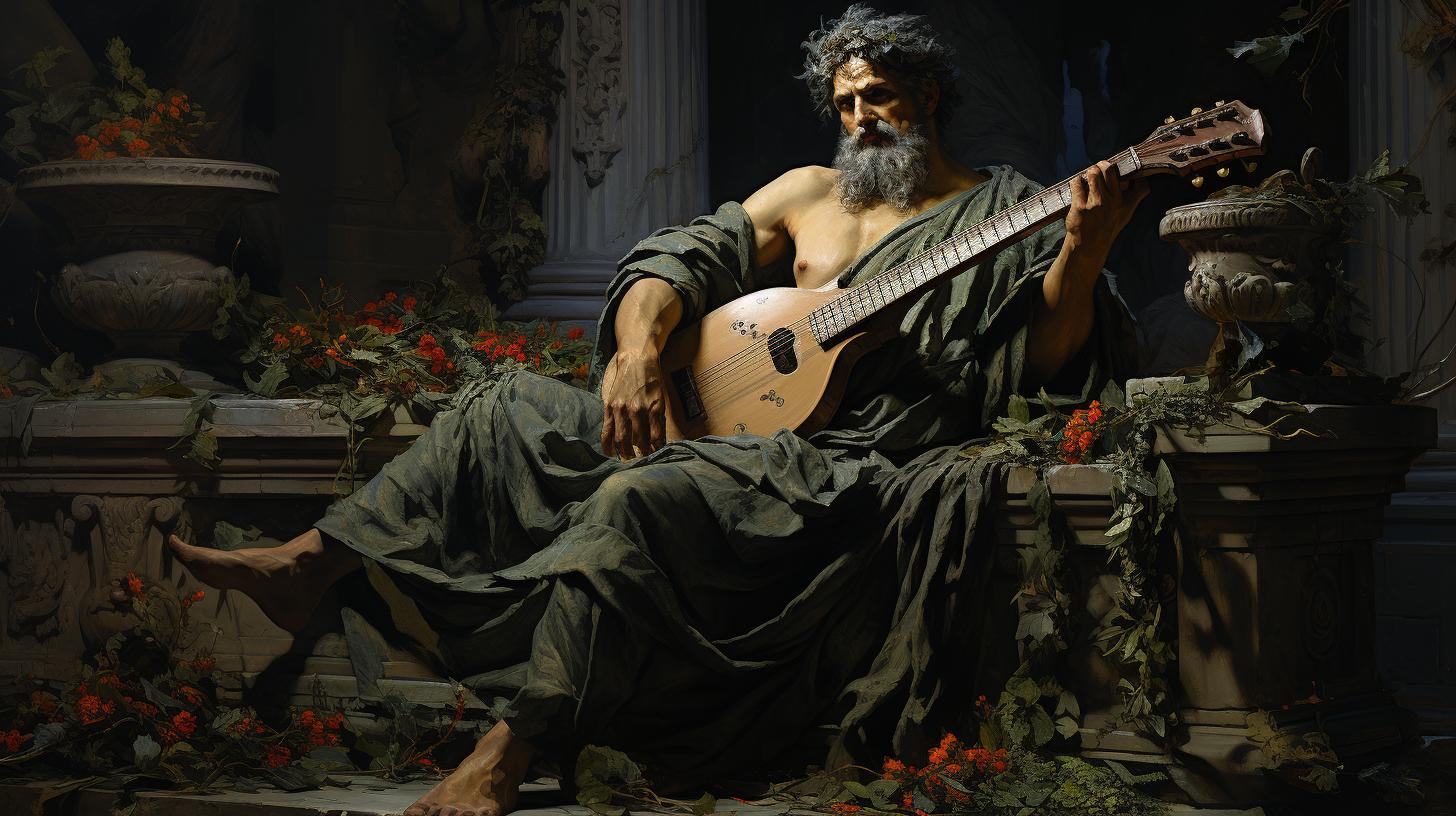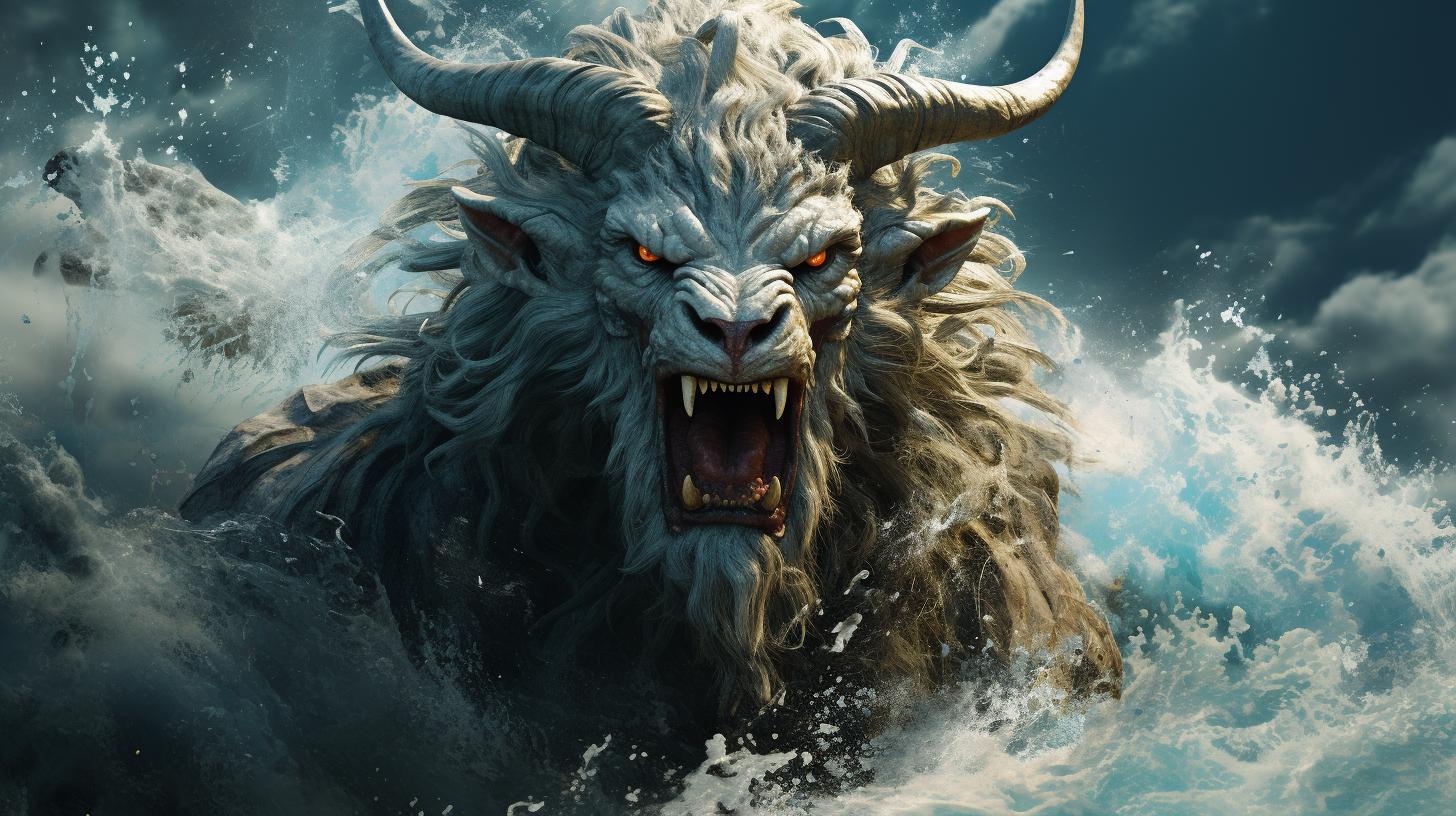Unveiling the Mythical Tales of Tmolus in Greek Mythology

Tmolus, a mountain deity in Greek mythology, holds a significant role in various tales and legends. As the judge in a musical contest between Apollo and Pan, Tmolus’s decision sparked disagreement and led to unforeseen consequences.
Additionally, Tmolus’s association with Gaia, the Earth goddess, places him among the primordial deities. Despite confusions and variations in the myths, Tmolus remains a symbol of power and influence. This article explores Tmolus’s mythology, his significance in the Roman context, and his representation in art and literature.
Overview of Tmolus in Greek Mythology
Tmolus holds a prominent place in Greek mythology, playing various roles and embodying rich symbolism. As the mountain god of Lydia, Tmolus is associated with musical contests, where his judgment shape the divine hierarchy.
Tmolus’ lineage connects him to significant figures, and his influence extends beyond Greek mythology to Roman contexts.
Throughout the myths, Tmolus’ most notable appearance is as the judge in a musical competition between Apollo and Pan. This contest highlights his discernment and authority in matters of art and culture.
It is said that Tmolus rendered the verdict in favor of Apollo, causing Midas to voice his dissent, leading to a notorious punishment.
Not limited to his role as a judge, Tmolus is also part of the primordial deities that predate the Titans, Olympians, and Humans.
His connection to Gaia, the Earth goddess, places him in the same lineage as other essential forces of nature. Born alongside the sky, sea, and mountains, Tmolus represents the mountain that proudly carries his name.
While some aspects of Tmolus’ mythology remain uncertain, it is clear that he occupies a significant place in ancient Greek culture and serves as an emblematic figure associated with music, judgment, and the fundamental elements of the natural world.
Unveiling the various aspects of Tmolus’ mythological significance allows us to grasp his enduring importance and explore his representation in art and literature.
Tmolus: The Mountain God of Lydia
Tmolus is a prominent deity in Greek mythology, revered as the mountain god of Lydia, an ancient region in Anatolia, present-day Turkey. This section delves into various aspects of Tmolus’ role and significance in Greek mythology.
The Family of Tmolus
In Greek mythology, Tmolus is depicted as the husband of Pluto (or Omphale) and the father of Tantalus. This familial connection adds depth to Tmolus’ divine lineage and highlights his importance within the pantheon of gods.
Tmolus as a Judge in the Musical Contest
A captivating myth revolves around Tmolus acting as a judge in a momentous musical competition between the gods Apollo and Pan. It is within this contest that Tmolus’ discerning judgment and role as an arbiter come to the forefront.
Midas and the Judgment of Tmolus
Midas, renowned for his golden touch, is also chosen as a judge alongside Tmolus in the aforementioned musical contest. However, a disagreement arises when Tmolus declares Apollo as the winner, leading Midas to express his dissent and proclaim Pan’s superiority.
This disagreement paves the way for unforeseen consequences.
The angered Apollo, displeased by Midas’ contrary opinion, delivers a divine punishment by granting him the ears of a donkey. This whimsical consequence showcases Tmolus’ involvement in divine judgment and the repercussions it can have.
- The Family of Tmolus
- Tmolus as a Judge in the Musical Contest
- Midas and the Judgment of Tmolus
Tmolus’ significant role in the musical contest and Midas’ punishment adds complexity to his character and solidifies his place in Greek mythology.
Through his judgments and interactions with other mythical figures, Tmolus emerges as a crucial deity in the mythological tapestry of ancient Greece.
Tmolus and Pan: The Musical Challenge
In Greek mythology, Tmolus finds himself immersed in a captivating musical contest between Pan and Apollo. This thrilling challenge unravels the different perspectives and talents of these two prominent figures.
Pan’s Disdain for Apollo’s Music
Pan, the satyr god of shepherds and flocks, holds a deep disdain for Apollo’s musical abilities. With his trusty flutes in hand, Pan confidently belittles Apollo’s harmonies, proclaiming his music to be superior.
Pan’s disdain for Apollo’s music sets the stage for an intense competition that will test their skills and earn the favor of the esteemed Tmolus.
Apollo’s Victory in the Presence of Tmolus
Decked in laurel of Parnassus and adorning a resplendent purple cloak, Apollo takes up his golden-stringed lyre to showcase his musical prowess.
As the notes from his lira gracefully fill the air, Apollo captivates both Tmolus and the audience with his divine melodies. The enchantment woven by Apollo’s music reverberates through the mountaintops, eventually earning him victory in the presence of Tmolus.
With his judgment, Tmolus bestows the honor of triumph upon Apollo, recognizing his superior talent and mastery of the musical arts. Pan, though disappointed, accepts Tmolus’ decision, acknowledging Apollo’s rightful status as the champion of the musical challenge.
- Pan expresses disdain for Apollo’s music.
- Apollo’s divine melodies impress Tmolus and the audience.
- Tmolus declares Apollo as the winner of the musical challenge.
The contest between Pan and Apollo under the watchful gaze of Tmolus highlights the power of music in Greek mythology and the significance of Tmolus as a judge and arbiter of musical excellence.
Continue reading to uncover more intriguing aspects of Tmolus’ mythology and his role as a primordial deity in Greek cosmology.
Confusion and Variations in Tmolus Mythology
Within the realm of Tmolus mythology, there is a significant amount of confusion surrounding the stories and different versions of Tmolus’ tale. As Greek mythology is rich in variations and interpretations, Tmolus is not exempt from such inconsistencies.
Different Versions of Tmolus’ Story
Various accounts present different versions of Tmolus’ mythological narrative. From the dispute between Midas and Apollo to Pan’s challenge against Apollo’s musical prowess, the details of Tmolus’ involvement vary across these retellings.
In some versions, Tmolus remains a neutral judge in the musical contest between Apollo and Pan, unswayed by Midas’ objection. However, other tales paint Tmolus in a more active role, making his judgment and subsequent consequences more influential.
Tmolus’ Name in Different Contexts
Besides the varied versions of the Tmolus myth, the name itself holds different meanings in various contexts. While Tmolus is primarily known as a mountain god in Lydia, there are instances where the name is associated with a Roman city in Lydia.
Furthermore, Tmolus is also linked to a genus of butterflies in the Lycaenidae family, showcasing the diverse meanings and associations that Tmolus’ name carries in different contexts.
Overall, the confusion and variations surrounding Tmolus’ mythology reflect the complex nature of Greek mythology itself.
The different versions and interpretations contribute to the multifaceted understanding of Tmolus as both a judge in a musical contest and a primordial deity connected to Gaia.
Tmolus in Greek Primordial Mythology
In Greek primordial mythology, Tmolus holds a significant role as one of the primordial deities, existing before the Titans, Olympians, and humans.
He is closely associated with Gaia, the goddess of the Earth and his progenitor. Gaia gave birth to Tmolus, along with Uranus, the sky, Pontus, the sea, and the Ourea, personifications of mountains.
Tmolus as a Primordial Deity
Tmolus is considered one of the ten Ourea, representing the mountain that bears his name. As a primordial deity, he embodies the ancient and elemental forces of nature. Tmolus’s presence in Greek mythology emphasizes the power and majesty of mountains, symbolizing their integral role in shaping the natural world.
Tmolus’ Relation to Gaia and the Ourea
Being born from Gaia, Tmolus shares a close connection to the Earth and the primal forces of creation. His association with the Ourea, the personifications of mountains, further establishes his link to the land and its natural formations.
The Ourea, including Tmolus, play a vital role in the Greek mythological landscape, representing the magnificence and awe-inspiring nature of mountains. They are depicted as powerful deities that influence the environment and evoke a sense of reverence among mortals.
Through his ties to Gaia and the Ourea, Tmolus represents the profound connection between the divine and the earthly realms. He signifies the harmonious existence of nature and its divine origins, showcasing the intricate relationship between the forces that shape the world we inhabit.
- Tmolus is regarded as one of the primordial deities in Greek mythology.
- He is closely associated with Gaia, the goddess of the Earth.
- Being one of the ten Ourea, Tmolus represents the mountain that shares his name.
- Tmolus symbolizes the power and majesty of mountains in Greek mythology.
- His connection to Gaia and the Ourea highlights the integral role of mountains in the natural world.
Tmolus in Roman Context
In addition to its significance in Greek mythology, Tmolus also held a notable place in Roman mythology and culture.
The Romans, known for adopting and adapting various aspects of Greek mythology, incorporated Tmolus into their own narratives and traditions.
Tmolus: A City in Roman Lydia
Within the Roman province of Lydia, there existed a city named Tmolus. Situated in the foothills of the mountain itself, this city served as a center of worship and reverence towards the deity Tmolus.
It was believed that the city held a special connection to the mountain god and served as a focal point for religious rituals and celebrations.
Tmolus as a Mountain in Roman Mythology
Just as in Greek mythology, Tmolus was revered as a divine mountain in Roman mythology as well.
It was depicted as a majestic and awe-inspiring mountain, shrouded in mythical stories and legends. The Romans associated Tmolus with the grandeur and power of nature, considering it to be a symbol of strength and endurance.
Stories and myths surrounding Tmolus as a mountain in Roman mythology often portrayed it as a sacred place where gods and mortals would converge. It was believed to be a realm where divine interventions took place, and where the presence of Tmolus could bring fortune or serve as a catalyst for significant events.
Furthermore, Tmolus’ association with music and contests continued to play a role in Roman mythology. The mythical contest between Apollo and Pan, judged by Tmolus, was seen as a testament to the mountain’s role as a hub of artistic expression and competition.
In Roman culture, Tmolus was celebrated through various forms of artistic representation, such as sculptures and paintings depicting the mountain god. These artistic tributes aimed to capture the essence of Tmolus’ power and significance within Roman mythology.
Conclusion
In Roman mythology, Tmolus held a significant place as both a city and a mountain. The city of Tmolus served as a center of worship and devotion, showcasing the reverence for the deity Tmolus.
Meanwhile, Tmolus as a mountain symbolized the grandeur of nature and served as a backdrop for mythical stories and divine events. The presence of Tmolus in Roman mythology emphasized the enduring influence and adaptation of Greek mythology within Roman culture.
Tmolus as a Symbolic Figure
Tmolus in Art and Literature
Tmolus, the mountain god of Lydia, has had a significant presence in various forms of art and literature throughout history. In ancient Greek pottery, Tmolus is often depicted alongside other gods, showcasing his importance in Greek mythology.
His image can be found on vases, plates, and sculptures, symbolizing his association with mountains and musical contests.
Tmolus has also found his way into literature, with many ancient Greek poets and playwrights making references to him in their works. Often portrayed as a wise and just deity, Tmolus serves as a symbol of impartial judgment and the consequences of challenging divine authority.
His role as a judge in the contest between Apollo and Pan has been a popular subject in poems and dramatic retellings.
Tmolus’ Influence and Symbolism
Tmolus’ influence extends beyond the realms of art and literature. As a symbol, he represents the power of discernment and the value of fair judgment. Tmolus reminds us of the potential consequences of voicing dissent against divine decisions, as seen in the story of Midas and the judgment of Apollo. This tale serves as a cautionary reminder of the dangers of challenging higher authorities and the need for humility in the face of overpowering divine forces.
Tmolus’ association with mountains also carries symbolic significance. Mountains are often seen as sacred places of divinity, serving as gateways between the earthly and the celestial realms. Tmolus, as one of the ten Ourea, represents a connection to the primordial forces of nature and the awe-inspiring power of the natural world.
His presence in Greek mythology highlights the reverence and respect ancient civilizations had for mountains as symbols of strength and divine energy.
.




















